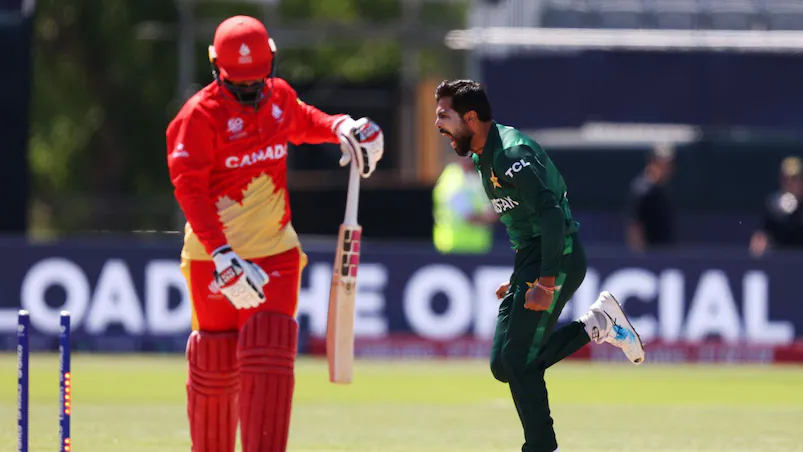
It was a must-win for Pakistan. The pressure was on them to secure a victory and keep themselves alive in the T20 World Cup. They did that by defeating Canada by seven wickets in their third Group A fixture. Pakistan might feel they could have wrapped up the game quicker to boost their net run rate, which could become crucial in the later stages of the tournament.
Canada’s batting was essentially a one-man show. Aaron Johnson strode onto the pitch with the clear intention of taking on Pakistan’s seamers from the beginning. His aggressive mindset was evident from the outset as he dispatched two over-pitched deliveries to the boundary. Shaheen Shah Afridi, bowling too full in an attempt to secure early wickets, ended up leaking runs. Recognising the need to bowl with more aggression, Naseem Shah started well in his first over, but it was Mohammad Amir who made the initial breakthrough. Following Naseem’s lead, Shaheen induced Pargat Singh to edge a back-of-length delivery to the slips after switching ends. Imad Wasim’s sharp fielding then dismissed Nicholas Kirton, adding to Canada’s woes.
Johnson stood firm, punishing over-pitched deliveries while respecting good-length balls and rotating the strike. Despite running short of partners, he soon reached his half-century. Unfortunately for Canada, he couldn’t continue. A short delivery from Naseem, directed at the stumps, kept low and in an attempt to heave it, Johnson lost his wicket. After his departure, Pakistan were expected to wrap up the innings quickly, but Canada’s lower order showed resistance and managed to surpass the 100-run mark.
The trio of Amir, Haris Rauf, and Naseem proved too good for the Canadian batters. The pitch offered ample bounce, particularly off a good length, which played to Pakistan’s advantage. However, they also gave away 13 extras, which was a lot, given how favourable the pitch was for the bowlers. To his credit, Babar Azam rotated his bowlers well.
Pakistan’s intent was evident from the beginning — they wanted to finish the match swiftly to boost their run rate. Openers Saim Ayub and Mohammad Rizwan tried to get off to a fast start, but the sluggish outfield and unpredictable pitch hampered their efforts. The young Saim couldn’t restrain himself and, on his second ball from Dillon Heyliger, he attempted an aggressive shot to be caught behind.
Skipper Babar joined Rizwan at the crease, and together they stabilised the innings. The pair ran well between the wickets, and as they settled in, they managed to find the boundaries occasionally. However, the prospect of a dominant win diminished as the innings progressed. Rizwan and Babar struggled to target any particular bowler for the big overs needed due to the challenging pitch and outfield conditions.
Babar eventually departed after getting into the 30s, but Rizwan remained steady. He guided Pakistan to their target, ensuring a solid finish without much hiccups.




